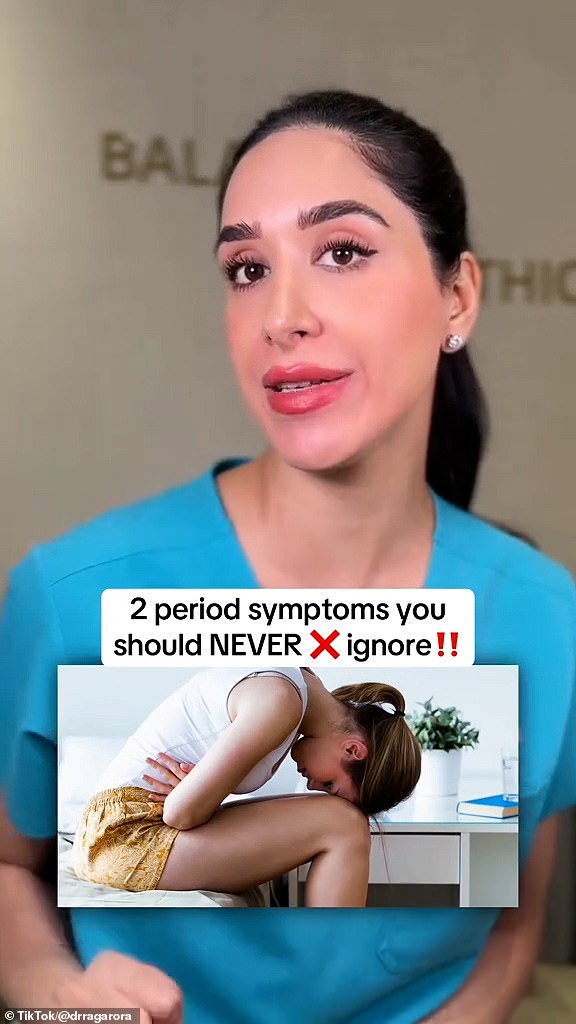A doctor has revealed the period symptoms you should ‘never ever ignore’ as they could be the sign of a more serious condition.
Dr Raj Arora, who is a GP in the UK, warned that certain symptoms could indicate endometriosis, polycystic ovary syndrome (PCOS) or even, in rare cases, cancer.
In a recent TikTok video, the GP urged women to seek advice from their doctor if they are experiencing heavy periods or spotting and explained that the two symptoms could be indicators of underlying health issues.
In the clip she said: ‘Number one, heavy periods. Now, this is really really important.’
Dr Arora said you can tell if you have especially heavy periods through a number of ways.
These include if: ‘You are soaking through pads or tampons within two hours; you’re having heavy bleeding for more than seven days; needing to change your pad or tampon throughout the night; or you’re passing clots that are larger than a coin or a quarter and they’re just passing through and feeling uncomfortable.’
The doctor then explained how heavy periods can cause serious knock on side effects.
She said: ‘If you’re having heavy periods like this that are not just heavy and uncomfortable, but also having knock on effects like dizziness or making you feel like you are going to pass out – you do not want to ignore this symptom.’

Dr Raj Arora has revealed the two period symptoms that women should never ignore as they could be a sign of serious conditions such as endometriosis and even cancer (pictured, with a stock image)
Arora continued: ‘This could be a result of fibroids, it could be a result of endometriosis, adenomyosis, PCOS. The list goes on.
‘You don’t want to be ignoring this you need to get help. Go and see your GP.’
The doctor went on to explain the second period symptom that should not go by untreated.
Dr Arora said: ‘Number two, spotting in between periods.’
The GP continued: ‘If you’ve got spotting between your periods it is really important to find out why.
‘This might be down to having cysts and having pelvic inflammatory disease. It might be down to having endometriosis, again PCOS.
‘And more importantly, if it is a result of pelvic inflammatory disease or a long standing infection in the pelvis, you want to get this treated because it can actually sometimes have an impact om your fertility as well.’
Without wanting to worry her viewers, the doctor added: ‘Sometimes bleeding in between periods can even be a sign of cancer.

The two symptoms mentioned by the GP were heavy bleeding and spotting
‘I don’t want to scare or worry you but it is important that if you are having bleeding in between periods you are seeing your doctor to get it checked out.’
Although several women were grateful for the tips many complained that they had gone to their GP about these symptoms and were brushed off.
One viewer said: ‘I don’t ignore it but my GP does,’ another responded to the comment in agreement saying, ‘Real, they just throw you on the pill.’
A second person wrote: ‘I never get my period. Haven’t had one since 2022. So [at the] start of this year I went to local GP, she ended up saying it’s cos I’m fat. I said what do you mean, she said you’re not getting your period cos your over weight.’
Another person added: ‘The gp will still say its in your head and will put you on birth control.’
Several other women told stories of being ignored by their GP, one said: ‘I bleed through a super tampons with a night pad in 30 minutes no doctors will listen they just say “is a normal part of being a woman” even when I’ve been bleeding constantly for four months.’
Endometriosis affects roughly 11 percent of American women – about 6.5million people, according to the US Office on Women’s Health (OASH)
It’s a condition where the tissue that normally grows on the inside of the uterus begins growing outside of it – on the ovaries, fallopian tubes or other internal organs.
The tissue inside your uterus is shed each month with your menstrual cycle, but the extra tissue on misplaced parts of your body has nowhere to go when responding to monthly hormonal changes, leading to a wide range of uncomfortable symptoms.
This can include painful sex, bloating, nausea, fatigue, depression and infertility. Between 30 and 50 percent of people diagnosed with the condition may experience infertility, according to Massachusetts General Hospital.
Experts don’t know what causes endometriosis, but it’s likely an interplay of your genes, hormones and immune system, or could have to do with trauma from surgery, according to OASH.
Because it’s so poorly understood, it takes an average of eight years after developing symptoms for someone to be diagnosed with endometriosis.











